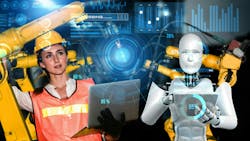Robots, With Humans in Tow, Are More Productive
In a June 21 article in the Harvard Business Review, the authors studied a variety of use cases of robots in the warehouse and their impact on the processes.
Their research has shown that even with highly automated processes, human beings have an important role to play.
One conclusion was as follows:
Our research has shown that simply adding a bit of choice to people’s tasks and the appropriate design of user interfaces can lead to significantly more system-wide productivity. In an experiment with collaborative robots in an order-fulfillment process where the workers picked items from storage locations, for example, putting humans in the lead (i.e., giving them a bit more autonomy) and letting robots follow as order pickers led to 8.3% greater productivity than when robots were in charge. These results align with self-determination theory, which says motivation and engagement come when a person has higher feelings of autonomy, competence, and relatedness.
Cobots, where humans and robots work together in a process, were also found to have specific benefits such as:
- Reduced travel times
- Reduced fatigue levels
- Higher Productivity
- More motivated employees
In these collaborations employees felt that their jobs were safer, caused them to make fewer mistakes and even made thier jobs more interesting.
Read here for the complete article.
